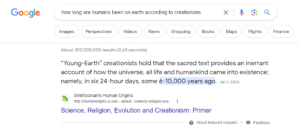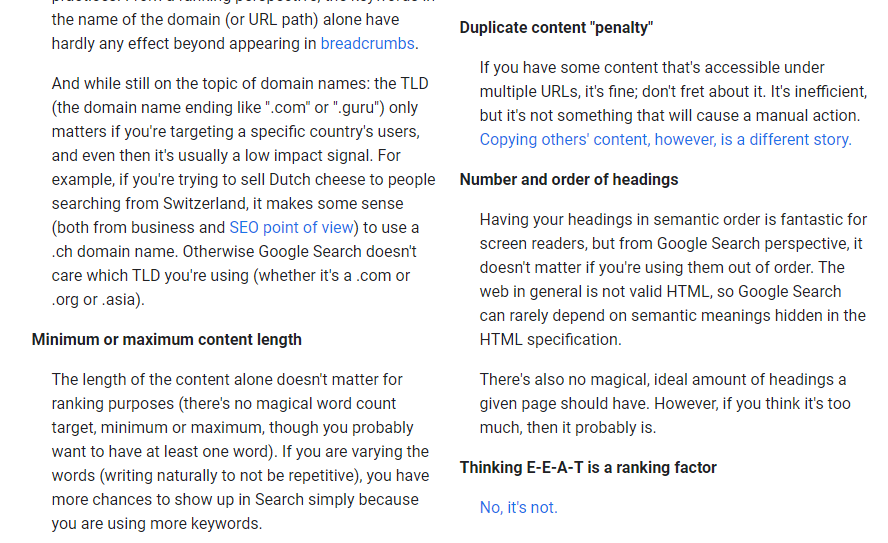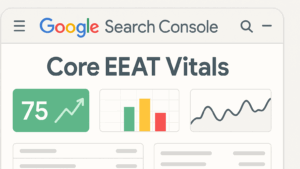Table of Contents
ToggleSEO is a story of two halves: PageRank and Mythology
There are a lot of myths about SEO, some have been around forever. The infamous “duplicate content myth”, still abounds, and nobody understands why. But it does. The funny thing about these myths is that the people who share them the most, also try to tell people that we don’t know how Google works, yet we’ve known since day one because Google has to publish its patents. Even to this day, in it’s recently updated SEO Google Starter Guide, Google still not only refers to PageRank but that it still relies heavily. Google has been playing down PageRank since it stopped publishing it some 15+ years ago. But people have since been promoting this idea that it’s gone. But it’s not – like it or love it, its how it works. It’s based on earning SEO authority – a control, a currency, a vote. It’s simple. It’s been the backbone of Google for 2.5 decades.
But a lot of people don’t like it.
What is Google EEAT?
The origins of the EEAT Guide: Google introduced a human review element to weed out websites that evaded its automated spam detection systems and seemingly outsourced that work. These human reviewers would use a basic guide that Google has adamantly, repetitively, and unquestionably labeled everywhere as “Does not impact ranking”. This “EEAT Guide” has since been taken from a probably defunct document to grade Spam Detection performance into a massive hoax pretending that Google understands a universal standard for Experience, Expertise and Authority or the “EEAT Guide.”
But EEAT in Google SEO was just too good to ignore – especially for those who don’t like PageRank.
RIP EEAT
Before I go any further, I just want to note that not only did E-E-A-T and E-A-T stipulate that it had no impact on ranking, but every update did too. But Google has this year canceled that human review process and, following a rare series of updates, it quashed all of the tactical ideas that EEAT promoters built their conjecture on. Because that’s all that exists of EEAT: A couple of documents that Google says is “a good idea for writers to follow” but “DOES NOT IMPACT RANKING”. But that wasn’t enough.
But what is Google EEAT in SEO?
So, Google came up with an acronym that it has since completely about-turned on, EEAT or:
- Expertise
- Experience
- Authority
- Trustworthiness
And Google’s reviewers would look at sites flagged as potentially spammy and ask themselves if it roughly lived up to this very subjective standard. Now, the sites that these reviewers were looking at weren’t the everyday sites that Google ingests. We’re talking about extremely low-quality, machine-built sites. To give you an idea of how much content Google ingests and how IMPOSSIBLE this review would be, lets take a step back 14 years ago at an update I remember very well: Google Caffeine:
Caffeine lets us index web pages on an enormous scale. In fact, every second Caffeine processes hundreds of thousands of pages in parallel. If this were a pile of paper it would grow three miles taller every second. Caffeine takes up nearly 100 million gigabytes of storage in one database and adds new information at a rate of hundreds of thousands of gigabytes per day. You would need 625,000 of the largest iPods to store that much information; if these were stacked end-to-end they would go for more than 40 miles.
You cannot apply those 4 bullet points to that much content. And that was 14 years ago – or roughly halfway through Google’s existence to today.
So, whats wrong with E-E-A-T?
Nothing, except its not a standard that Google holds to ANY of the content in its index. Its an impossible standard to put on human content. Because its completely subjective. There is no standard of expertise for the vast majority of content. Firstly, just to take this apart requires an enormous amount of explanation but I’ll try.
We think of Google holding a vast collection of human content – its the largest in our human history. This is an interesting point in itself, because – depending on who you find in Google, how long humans have been here isn’t exactly answered very authoritatively. Or with expertise. There’s the settled number that science gives us – 190,000 years for Homo Sapiens. But, if you search from a creationist viewpoint, Google gives us this result out of 353 MILLION pages!

Is Google the largest collection of human content?
Kind of. Google has indexed and ingested more content than any other system. And in a scale far higher, 10^10 more than any other library, journal, collection, or institution. But most of that content is of little to no interest to those organizations. They, on the other hand have collections that might live in Google and might not. But things like car manuals, text books, most published books for that matter, aren’t indexed in Google, mainly for copyright and commercial reasons.
And so – the problem of Expertise and Authority arise. For most of the content that Google indexes – and its not just blog posts and marketing or news or scholarly articles, its just content. Content for the sake of content. Musings. Diaries. Theories. Conversations. Debates. Stories of fiction. Fantasy. Reviews.
And Google cannot verify or validate or certify or even process ANY of that. Google cannot apply – and doesn’t even want to – and nor should it – be the arbitrator of what people should, can or want to produce or read. Except obviously where it has to step in with egregious political misinformation or healthcare misinformation (like the recent pandemic)
Every minute, 3.8 million queries are answered by Google. Here’s how it says it handles it:
With the vast amount of information available, finding what you need would be nearly impossible without some help sorting through it. Google’s ranking systems are designed to do just that: sort through hundreds of billions of webpages and other content in our Search index to present the most relevant, useful results in a fraction of a second
Just that: sorted. Not interrogated. Not vetted. Not fact checked. Sorted.
Like Youtube, Tiktok, Google is – nay, has to be – content agnostic.
Because you cannot wrap individual – and there are some 3.8 billion Google search users – subjective ideas about “good content” inside an objective machine. Even with AI, again, which google doesnt try to do – because it cannot be done. Its not a question of how or scale, its just not possible. There are 353 MILLION pages that have the wrong date of the founding of the universe. Because being objectively correct would upset 25% of Americans….
Where does EEAT Expertise come in?
With Good content and the rise of “Content is King” (I will forever be: Context is King and Emperor), people have tried to build E-E-A-T into something its not, even thought Google stamped EVERY document saying so. People want to – for whatever reason – pretend that they can convince people that Google can objectively measure and grade content. Like some ivory tower.
I’ve thought and thought about this so much for years – and all I’ve ever had is questions, so I’ve no idea how these people sleep at night not thinking that
- Is Google supposed to discern who is better – Stephen King or Shakespeare?
- Who is more accurate?
- Who is more expert?
- How do you apply EEAT to fiction?:
- What about Golf? How can ANY content on golf be good?
- What if it was about how golf courses were being destroyed to build wildlife parks or homes for the homeless – wouldn’t that be good?
How can you even objectively measure E-E-A-T’s elements?
Expertise: I’ve been in SEO for 24 years. Am I an expert? What if all I did for 20 years was edit page titles? What if someone who was in SEO for 6 weeks, and they outranked me. Doesn’t that make them more effective? Doesn’t that lend exercise? If you’re any good at comprehension and hopefully critical thinking, you should have found all of this abhorrent by now – but no, people have been trying to insist for years that Google can objectively test EVERYONE – every landing page, every blog, every recipe, every page listing a car part for Expertise.
What about Trustworthiness? Surely there’s no fake news anywhere.
I can go on and on – but I shouldn’t have to. Any reasonable and logical person should realize that ALL of the content in Google, not some, not the majority, ALL of it, cannot meet these standards:
- Expertise
- Authority
- Trustworthiness
- Experience
How does Google verify this? A fleet of international blog inspectors in EVERY country, in EVERY language?
But here – Published in March 2023, available on Google today (Feb 4, 2024)
Basically, double E-A-T is all about showing off the personal experience you have with your niche, which is a ranking factor Google is now looking for in your content.
For instance, let’s say that you’re going to post a product review for something that you own and use every day, like your keyboard. Since you’ve used it, you’ll know lots of highly specific things about it that you like and some things that you don’t, which is due to your personal experience with it.
Rather, suppose you mention how you love the long battery life for airplane rides, easy-to-press keys for optimal typing speed, and transportability for writing on the go. In that case, it becomes clear that you’ve actually used the product, and your review becomes more valuable as a result.
Thanks to the Helpful Content Update of 2022, Google’s algorithm will also notice the personal experience you displayed in your review, and you’ll rank higher because of it.
Tere are several problems with this. First – it says Google will rank you for this – which directly contradicts the E-E-A-T document that this is extrapolated from – but then it says “Google will detect” whether this experience was real. I can go on and on and copy and paste the same or similar ideas from E-A-Ters, which just keep changing the goals posts.
This was published in October 2023:
Even with impeccable content and strategic SEO, many neglect a powerful boosting strategy: author bios. They’re not just formalities but pivotal assets, often under appreciated.
Overlooking author bios diminishes content’s perceived expertise and trustworthiness, leaving potential SEO gains on the table.
Through E-E-A-T, author bios emerge as critical drivers of value. Expertise, Authoritativeness, Trustworthiness, and Experience shape content rankings.
This was published in 2019:
John Mueller Downplays Author Bio Pages
Mueller does not at any point indicate that the author biography page is an important SEO factor. There is no indication from him that it is important to show the author bio. Instead, he focuses on how it impacts site visitors.https://www.searchenginejournal.com/author-biography-google-ranking/312175/
Now, nowhere in EEAT are author bios mentioned. Promptly – or at least 3 months later, Google had to start publishing these individual tactical take-downs
Google Disassembling the EEAT Fraud
- Google: You Don’t Need To Be An Authority To Rank
- https://www.searchenginejournal.com/google-you-dont-need-to-be-an-authority-to-rank/429921/
- Google: Author Bylines Not A Ranking Factor
- https://www.searchenginejournal.com/google-author-bylines-not-a-ranking-factor/505218/
- Google: Page Size Is Not A Ranking Factor
- https://www.seroundtable.com/google-page-size-ranking-factor-35025.html
- Google Again Says Schema Does Not Make Your Site Rank Better
- https://www.seroundtable.com/google-schema-ranking-boost-36291.html
Every single Myth – repetitively. In the document above, from 2019, Search Engine Journal Notes:
Authorship Signals
The SEO industry believes that Google’s Quality Raters Guidelines describe how to rank better in Google. It is from those EEAT guidelines that the belief that naming who the author is and listing their biography and credentials are a technical requirement to check off the SEO ranking signal list.https://www.searchenginejournal.com/author-biography-google-ranking/312175/
E-E-A-T – What should be the final nail
But here we are. Then Friday, Google updated the SEO Starter Guide which reads, on Page 1, in its SEO Myths (Things we believe you shouldn’t focus on)

But still – the majority EEAT Content pushers still believe. And if thats not a cult, if thats not cognitive dissonance, if thats not an outcome of attempted gas lighting, then I don’t know what is.






